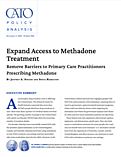Expanding Methadone Access
Featuring
The National Center for Health Statistics reported that more than 107,000 people died from drug overdoses in 2021. More than three‐quarters of overdose deaths involved opioids. Recent research estimates the number of adults living with opioid use disorder (OUD) ranges from 6.7 million to 7.6 million. These estimates suggest that 1–2 of every 100 U.S. residents has OUD.
In the United States, federal and state laws require people with OUD who seek treatment with methadone to travel to government‐approved opioid treatment programs, which limits access to methadone treatment. Increasing access to OUD treatment would reduce the number of people who seek drugs in the dangerous black market and, in turn, reduce the risk and incidence of overdose deaths.
Please join us at 1:00 p.m. on Thursday, September 14, in the Russell Senate Office Building, Room SR-188, as Dr. Jeffrey A. Singer, senior fellow at the Cato Institute, shares his new policy analysis on expanding methadone access.
Lunch will be provided
Featured Study
Expand Access to Methadone Treatment
Federal and state regulations discriminate against, stigmatize, and dehumanize opioid users, and limit access to methadone treatment for many people who need and can benefit from such treatment.

This work is licensed under a Creative Commons Attribution-NonCommercial-ShareAlike 4.0 International License.

